

San Bernardino County’s almost 500-acre San Timoteo landfill upgraded with gas monitoring and controls that manage its four blowers, flare station, pumps, valves, thermocouples, and other devices. There are 340 tags, 16 screens and more than 50 alarms monitored and managed by web-based SCADA software. Simpler, streamlined SCADA is more capable and closely connected, and less costly for landfill gas monitoring and control.
San Timoteo added options such as 3D imaging from flying drones and augmented reality (AR) displays. After flying the site, the imagery is uploaded to update its map and create point-cloud graphics. Aerial data is used to create topographic mapping, 2D images, 3D renderings, and GIS, thermal and tunable diode laser (TDL) images for methane leak detection.
Landfill operators and managers can remotely view the site using a mobile device, and “walk the site” from their offices or anywhere using the HoloLens.
Now nearly all landfills can afford to gather data with Ethernet and wireless networking, analyze data with sophisticated software, and display it on ubiquitous interfaces including tablet PCs and smartphones. The trick is applying the technologies in applications that enable more effective decisions.
Read the article in Control Magazine.
Watch a quick video at San Timoteo.
On July 7, 2020, the City of Brownsville Commission approved a recommendation by the Engineering and Public Works Department to continue an existing multi-year partnership with SCS Engineers. SCS is an environmental consulting and contracting firm that will serve the City for an additional five years. The environmental contracts support the Landfill Gas Collection and Control System (GCCS) expansion and provide landfill engineering, compliance, monitoring and operations assistance.
Project Director, J. Roy Murray, an SCS vice president, and the team’s principal consulting engineer will continue to serve the City’s citizens and staff. Mr. Murray has decades of experience in civil and environmental permitting, design, and construction at municipal solid waste landfills (MSW), including 20 years serving the Brownsville Landfill. Mr. Murray states:
The City staff and Commission continues to entrust SCS Engineers to help the landfill staff with the safe, efficient, and compliant operation of the landfill. We are honored by their trust. The City of Brownsville MSW Landfill Operations team serves the City well. The facility is the primary solid waste disposal site for surrounding communities, carefully engineered and maintained regularly even during severe weather and now a pandemic. The forethought of the Landfill Division, their leadership, and innovative practices provide the citizens with stellar services while protecting the environment.
The initial installation of the City Landfill’s Gas Collection and Control System (GCCS) completed in 2011, was part of an Energy Efficiency and Conservation Block Grant the City received from the American Recovery and Reinvestment Act of 2009. SCS Engineers assisted with the application process, and as a result of the collaboration, the City received a $1.7 million grant to install a landfill gas collection system at the landfill. With GCCS operation, the City has reduced its greenhouse gas emissions. The landfill infrastructure and emission reductions were voluntary at the time, but the Texas Commission on Environmental Quality (TCEQ) Air Quality rules and regulations, and EPA’s New Source Performance Standards, now require them.
The Gas Collection and Control System consists of 16 landfill gas extraction wells and currently provides coverage of 32 acres of the City Landfill’s disposal footprint. The City plans to expand the GCCS during 2021, to support landfill’s growth and stricter air permit regulations. The expansion includes 38 additional wells covering 120 acres of the landfill footprint. The new wells will integrate with the collection system and integrate with liquids management, leachate control, and stormwater systems, among others.
About SCS Engineers
SCS Engineers’ environmental solutions and technology are a direct result of our experience and dedication to solid waste management and other industries responsible for safeguarding the environment. For more information about SCS, please follow us on your preferred social media channel, or watch our 50th Anniversary video.
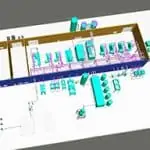
SCS is receiving the Gold Business Achievement Award for a Large Environmental Firm, for outstanding business performance in 2019. We largely attribute our organic growth to our clients interested in Sustainable Materials Management (SMM) and renewable natural gas (RNG) services. Our SMM programs increase our clients’ solid waste management efficiencies, reduce waste, and support sustainable recycling, and our design and design/build facilities convert landfill gas, dairy digester gas, and wastewater treatment plant digester gas to RNG. In addition, SCS’s Geographic & Practice Area Expansion initiative in 2019 enables us to expand our professional engineering and consulting services for liquids management, wastewater treatment, and emerging contaminants from new offices in the South, Central, and Midwest regions of the United States.
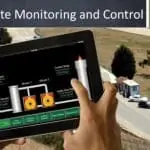
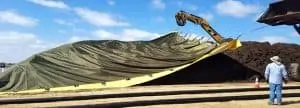
The Environmental Services Division of the city of San Diego, in collaboration with SCS Engineers, is receiving the Composting Project Merit Award in recognition for the composting operation at the Miramar Landfill in San Diego. In collaboration with the City, SCS designed an innovative covered Aerated Static Pile (ASP) composting system that will divert 100,000 tons per year of organic waste from the landfill. The ASP became operational in August 2019 and will compost 40,000 tons per year into useful by-products (and has capacity for an additional 20,000 tons). It provides an enhanced stormwater control system, and will eventually run on renewable energy generated from the landfill. According to the StopWaste.com calculator, the upgrade reduces greenhouse gas emissions by the equivalent of removing 19,015 cars from the road.

In addition, the recent announcement of SCS’s ASP Composting Pilot Program is making headlines. SCS owns a covered ASP compost system that is mobile and can be set-up on sites within an area of 50 feet by 100 feet, or less. In the covered ASP compost system, process and odor control is pro-active with a shorter composting period. Pilot tests allow waste managers to assess composting and to see if it is the right fit for their situation. The ASP system processes material batches in two months. Additional batches or “recipes” can test in 2-month intervals.
“Managing air, water, and soil pollution prevention are driving state and local regulations,” said Bob Gardner, a Senior Vice President of SCS Engineers. “Offsetting as much of the cost by improving operations, lowering energy consumption, and switching to renewable energy resources is critical to our clients.”
About SCS Engineers
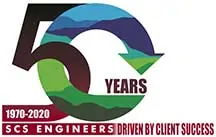
Our technologies and programs are finding footholds in the agricultural, industrial, and manufacturing sectors as municipalities and companies aim to reach climate change goals without passing all of the expense to consumers. SCS clients entrust us with the management of more than 35 million metric tons of anthropogenic CO2e greenhouse gases every year. We collect and beneficially use or destroy enough to offset greenhouse gas emissions from 7.4 million passenger cars annually.
Inductive Automation® announced the software firm now recognizes SCS Engineers as a Premier Integrator. Premier Integrators have a high level of commitment, professionalism, and competency using the Ignition software. They must consistently produce high-quality work and must consistently demonstrate successful projects with very satisfied end-users.
SCS uses Inductive Automation’s Ignition supervisory control and data acquisition (SCADA) software in their solution because it is a proven state of the art software, which works well with cloud-based systems and the internet of things (IoT). It allows clients to easily control, track, manage and report on their processes.
Large landfills, counties with multiple landfills, and private waste management firms have been waiting several years for SCADA software to catch up to their business needs. Landfill operations are extremely complex and expensive since they monitor and manage multiple systems to protect the public from contamination to the air, water, or soil. There are typically multiple operations active on many sites, such as waste recovery, recycling, composting, Gas Collection and Control Systems (GCCS), and renewable energy plants.
SCS Remote Monitoring and Control®, or SCS RMC® provides a next-generation option to monitor and control systems, and see the data collected and the systems in action. It allows users to control their systems remotely, collect data and use the data to enhance their productivity, reduce their operations and maintenance (O&M) costs, and reduce their environmental risk. Other offered services include 3D imaging from drones and virtual reality (VR). SCS uses aerial data collected via drones to compose topographic mapping, 2D images, 3D renderings, GIS, thermal, infrared (IR), and methane leak detection for waste facilities. The SCS RMC® team can take rendered models and apply them into virtual reality (VR) headset as well, which allows decision-makers at waste management facilities and organizations to “walk the site” from anywhere.
Current clients save Operating & Monitoring (O&M) costs and reduce human error by generating internal and regulatory reports automatically, using data automatically collected by the system. They can also receive instant notification of malfunctions and can troubleshoot these notifications remotely.
Not only for landfills, until recent years the public did not realize the long-term value of recycling nor the associated costs. Some clients use SCS RMC® to monitor dumpsters and recycling receptacles for collection. This helps keep waste and recycling inside the container, collection schedules more efficient, and overall operations less costly.
Manufacturing, industrial facilities, and ports use remote monitoring and control for real-time viewing, analysis, and control of equipment and systems critical to production and safe operations, often for air monitoring.
Galen Petoyan, Senior Vice President of Field Services states, “We fully embrace SCS RMC® within SCS Field Services® because the software allows us to provide more value to our clients; our technicians and engineers can avert problems, and when needed, provide rapid, efficient, and accurate analysis and action.”
To support the growing use of technology by municipalities, in waste management, and by industrial and manufacturing clients, SCS Engineers is opening new offices. The newest office is in Lancaster, Pennsylvania. The office provides environmental engineering, consulting, and is the base for the east coast SCS Remote Monitoring and Control® (RMC) professionals.
The office is the third SCS location in Pennsylvania, and is located at:
SCS Engineers
1861 Charter Lane
Suite 107
Lancaster, PA 17601
Tel: +1-717-550-6330
SCS RMC® works closely with the firm’s business sectors developing software, applications, and support services, which harness technology to capture, track and evaluate environmental data, provide remote monitoring and controls, and drone services with advanced capabilities.
The SCS RMC® platform and applications help public and private clients control their equipment remotely, collect data and use the data to enhance their productivity, reduce their operations and maintenance costs, and reduce their environmental risk. The tools are versatile; SCS programmers, engineers, and scientists are available to develop custom applications meeting a spectrum of industrial environmental objectives for groundwater, leachate, air monitoring, and landfill gas management.
SCS RMC® uses a network of sensors and Machine-to-Machine (M2M) applications to help minimize equipment downtime by alerting staff to maximize production or to an operational safety issue. The system supports additional monitoring components as operations grow, providing facility owners and operators with a single secure application for their supervisory control and data acquisition (SCADA), data management, and reporting needs.
SCS RMC® is experiencing exponential growth, as industrial operations need technology most when reaction time is essential to avoid production downtime and continue operations within regulatory mandates to maintain public safety standards.
To discover how these and other next-generation technologies can support your operations, contact SCS at , or use the links below to explore:
Do you glaze over when the tech-speak starts? In our blog, we’ll try to prevent that from happening while describing new technology for landfills and industrial use. We’ve merged our SCS Engineers technology with some new web-based technology that will make your landfill, facility, or plant safer for workers and help lower operational costs. Not only that, with SCS Dataservices® (already on over 600 landfills) you will have a complete and accurate record at your disposal.
You can find information on our website, but here we describe the most exciting new Remote Monitoring and Control (RMC) options:
SCS owns a small fleet of no-crew aerial vehicles (UAVs) and employs licensed UAV pilots nationwide. The use of UAV technology, commonly known as drones, can produce photogrammic and aerial photographic imagery offering site owners and operators the ability to take measurements from photographs, especially useful for recovering the exact positions of surface points quickly and efficiently. Some of the benefits of UAVs are:
SCS deploys UAV technology on a case-by-case basis as an adjunct to our RMC® services. We also offer to consult and training on the implementation of UAV programs at solid waste and other facilities.
SCS can also present real-time data in mixed reality environments (e.g., Microsoft HoloLens2). Augmented 3D facilitates the difficult task of visualizing actual and conceptual site conditions. Another application of reality technology includes analyzing landfills in more than three dimensions by combining multiple datasets. These 4D models enable operators to view conditions over time, providing the ability to detect and measure changes and insight into the benefits of critical infrastructure such as earthworks and systems. One could add costs as a 5th dimension to visualize the resources, time and money needed to move solid materials.
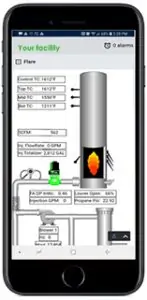
The SCS RMC® team integrates web-based technology called Ignition 8 into our client solutions. An Inductive Automation product, Ignition 8 enables us to build dynamic industrial applications that automatically respond to each client’s unique perspective.
Ignition Perspective enables us to build full SCADA, HMI, and alarm systems, and provide clients with a mobile view of their operations via smartphones and other mobile devices. Full-control of industrial processes is more mobile, customizable, scalable, and secure than ever before. For example, one of our clients uses advanced SCS RMC® – Ignition Perspective HTML 5 integration for remote access and control of piping and instrumentation diagrams that stream live sensor data. The application reduces O&M costs by:
Read Waste Today’s article Using Drones for Landfill Monitoring to learn more.